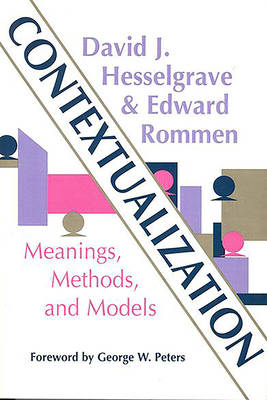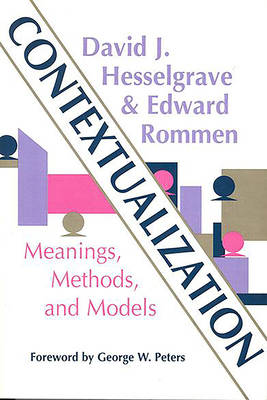
Bedankt voor het vertrouwen het afgelopen jaar! Om jou te bedanken bieden we GRATIS verzending (in België) aan op alles gedurende de hele maand januari.
- Afhalen na 1 uur in een winkel met voorraad
- In januari gratis thuislevering in België
- Ruim aanbod met 7 miljoen producten
Bedankt voor het vertrouwen het afgelopen jaar! Om jou te bedanken bieden we GRATIS verzending (in België) aan op alles gedurende de hele maand januari.
- Afhalen na 1 uur in een winkel met voorraad
- In januari gratis thuislevering in België
- Ruim aanbod met 7 miljoen producten
Zoeken
Contextualization
Meanings, Methods and Models
David J Hesselgrave, Edward Rommen
Paperback | Engels
€ 39,95
+ 79 punten
Omschrijving
Meanings, Methods, and Models
Contextualization: Meanings, Methods, and Models is a classic textbook that brings together the meanings, proposals, and tasks involved in contextualization. The authors trace its historical development, beginning with its roots in the Bible and early Church. They examine how cultural, linguistic, and theological elements influence the way the Gospel is communicated across different contexts. The book highlights how the Church has wrestled with expressing timeless truths in culturally relevant ways, while maintaining biblical integrity.
Hesselgrave and Rommen engage with the ideas of key theologians and missiologists, evaluating a range of contextualization models--from traditional mission methods to more adaptive, culture-centered approaches. They provide a balanced critique of these proposals, identifying both strengths and limitations. The authors conclude by offering their own definition and approach to contextualization--one that is both faithful to Scripture and practically effective for global mission work today.
Contextualization: Meanings, Methods, and Models is a classic textbook that brings together the meanings, proposals, and tasks involved in contextualization. The authors trace its historical development, beginning with its roots in the Bible and early Church. They examine how cultural, linguistic, and theological elements influence the way the Gospel is communicated across different contexts. The book highlights how the Church has wrestled with expressing timeless truths in culturally relevant ways, while maintaining biblical integrity.
Hesselgrave and Rommen engage with the ideas of key theologians and missiologists, evaluating a range of contextualization models--from traditional mission methods to more adaptive, culture-centered approaches. They provide a balanced critique of these proposals, identifying both strengths and limitations. The authors conclude by offering their own definition and approach to contextualization--one that is both faithful to Scripture and practically effective for global mission work today.
Specificaties
Betrokkenen
- Auteur(s):
- Uitgeverij:
Inhoud
- Aantal bladzijden:
- 294
- Taal:
- Engels
Eigenschappen
- Productcode (EAN):
- 9780878087754
- Verschijningsdatum:
- 1/09/2000
- Uitvoering:
- Paperback
- Formaat:
- Trade paperback (VS)
- Afmetingen:
- 152 mm x 226 mm
- Gewicht:
- 385 g

Alleen bij Standaard Boekhandel
+ 79 punten op je klantenkaart van Standaard Boekhandel
Beoordelingen
We publiceren alleen reviews die voldoen aan de voorwaarden voor reviews. Bekijk onze voorwaarden voor reviews.









